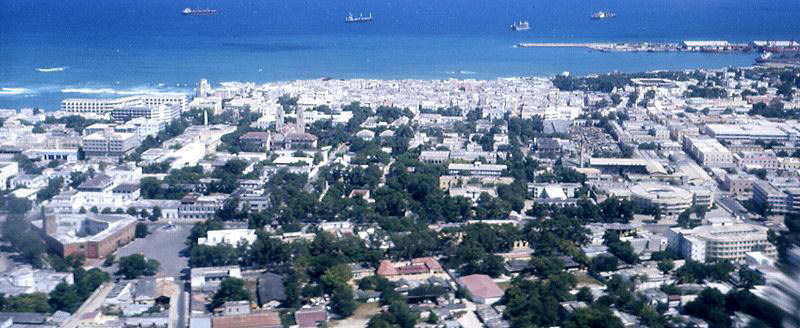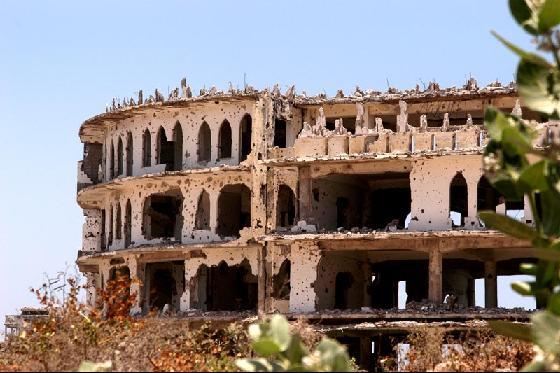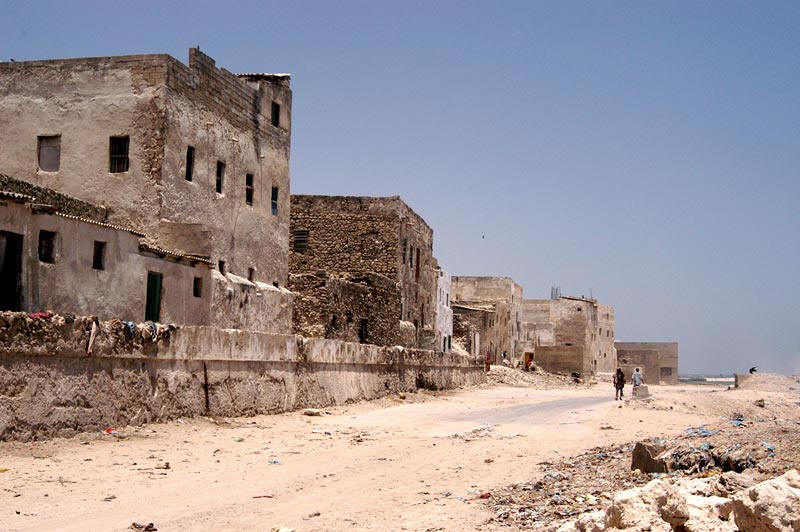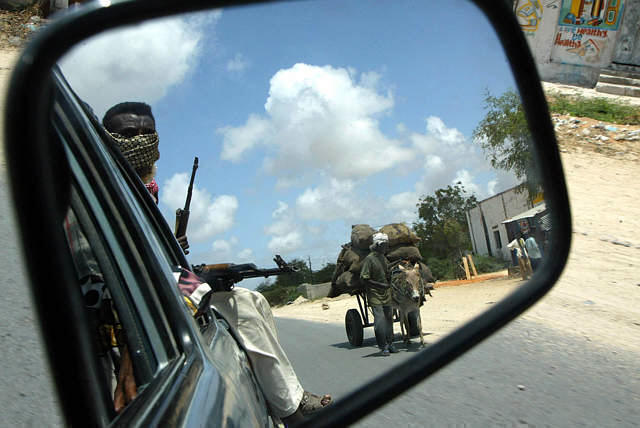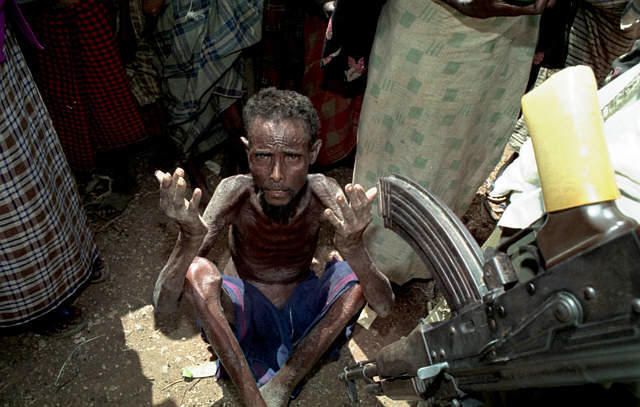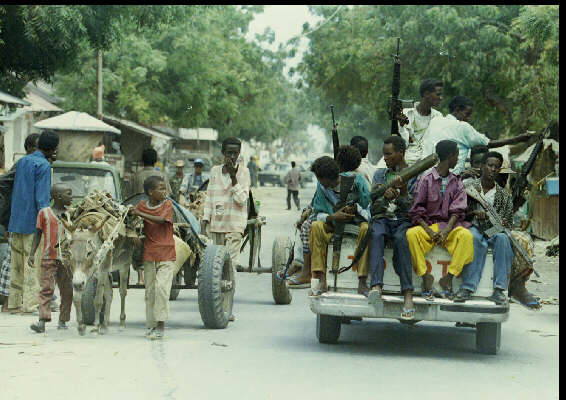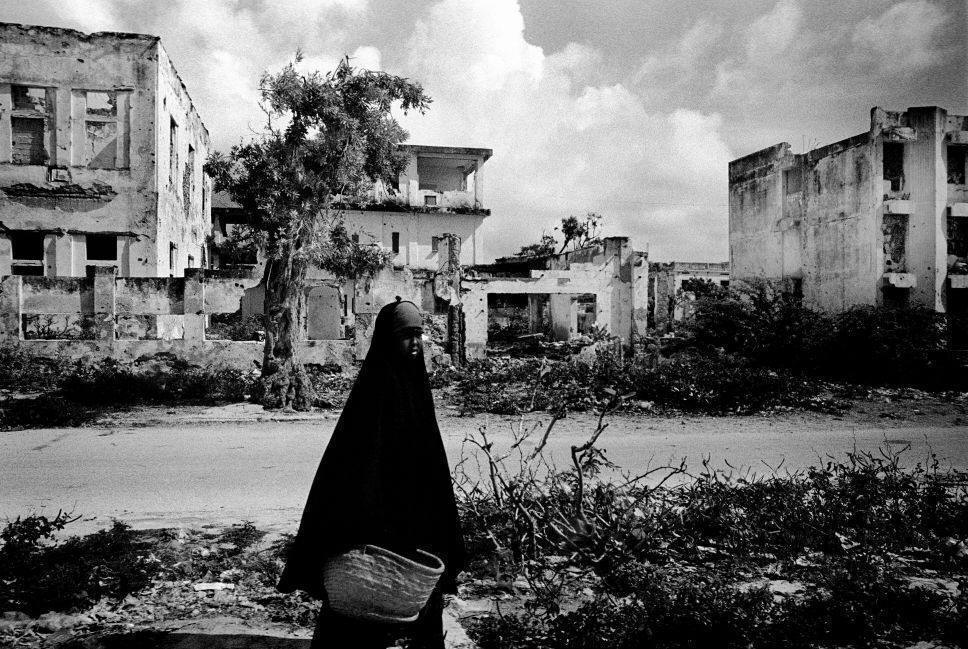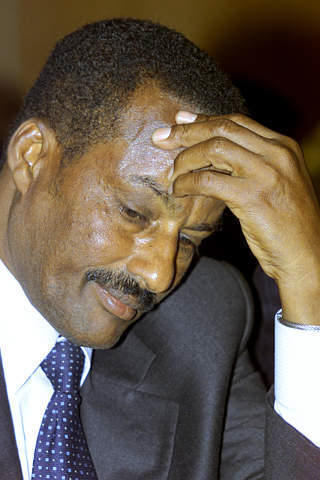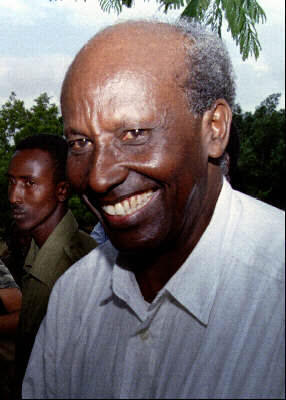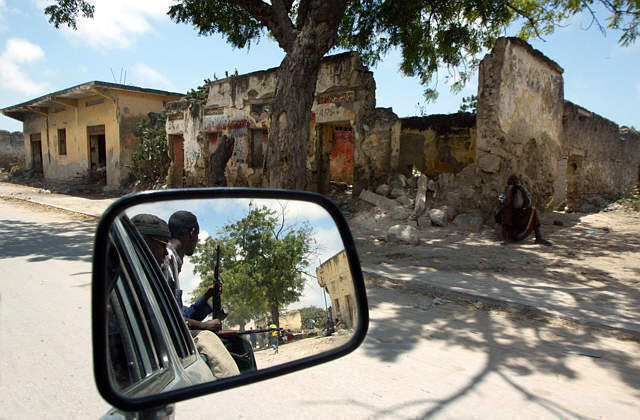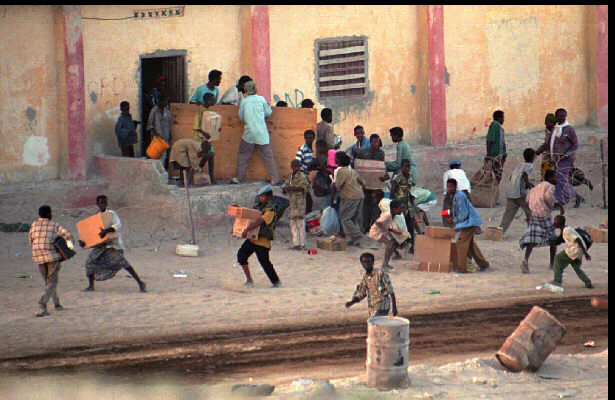| Zooming into the Past | |
|
M O G A D I S H U C I V I L W A R S
Introduction
Zooming into the 1990s interviews and statements, given by the spokespersons and leaders of Somali factions, enables us to prove that clan-animosity account of the Somali civil war has not been given the scholarly attention that its magnitude warrants, even after sixteen years of clan-warfare. This clan-animosity feeling can in fact be derived from faction joint communiqué and statements; and therefore, posting selections of these public relation statements should be a matter of concern to all Somalis – particularly, to those who are in the field of Somali Studies.
After all, clan factionalism disguised in English acronyms (formed from three or four initial letters which include the sacrosanct letter “S”) are now facts of life for Somalis. The words and deeds of the turbulent faction followers have ordained to presuppose that faction spokespersons assumed a monumental role in fuelling clan-hatred. As a result of that, the Forum rushes in to investigate and share with you excerpts of faction communiqués, hoping to find solutions to the current tragic political situation in Somalia. From our perspective, these selections are indeed those that Western scholars/(Somalists) most neglected, or could offer hints to the causes of the civil war.
J U L Y 1 9 9 0 s
Somali gunmen drive through the streets of Mogadishu
OLD MAN BEGS FOR HELP FROM SOMALI GUNMAN IN CITY OF BAIDOA, SOMALIA
A young Somali smokes and holds a weapon as he and his friends sit on a car
Children pulling a donkey cart watch a carload full of armed militiamen pass through the streets of Mogadishu
DFSS Aide Says UN Wrong To `Overrate' Aidid
Milan IL GIORNALE in Italian July 05, 1993 p2
[Interview with Yusuf Mohamed Ismail, "international relations secretary" of the Democratic Front for the Salvation of Somalia, by Andrea Pucci in Rome; date not given]
[Text] Rome-"It is right and necessary that Italy should have a greater role in political liaising in Somalia. Operation Ibis is proof of that." Those were the words of Yusuf Mohamed Ismail, known as "Bari-Bari," international relations secretary of the DFSS [Democratic Front for the Salvation of Somalia], the oldest of the opposition movements, led by General Mohamed Abshir Musse. The DFSS was the first movement to encourage Italian intervention, and now it is calling for greater consideration to be given to the Rome government in view of the way the situation in Somalia is evolving. "The United Nations has frequently shown that it does not stick to the decision taken, that it gives in to unjustified pressure from extremists."
[Pucci] What has gone wrong so far, from Operation Restore Hope to UNOSOM II [UN Operation in Somalia]?
[Ismail] One of the United Nations' main shortcomings has been its failure to spread the Blue Helmets out over the entire territory as planned. Hitherto, for the past seven months, the UN presence has been felt principally in Mogadishu. Because, among other reasons, people continue to identify Somalia with Mogadishu, which is not the case at all. The result is that there is no trace of multinational troops in the north-central area of the country.
[Pucci] Fundamentalism is making itself felt in North Africa. Is Somalia also in danger of seeing an escalation in terrorism?
[Ismail] The information we have tells us that the radical fundamentalist wing has been active in the country since at least 1989, under international control. In June 1992 the fundamentalists caused a sensation by openly attempting to pull off a military coup in the northeast. First the populace, then DFSS forces succeeded in thwarting the blitz after a bloody clash. Now their strategy has changed. On the one hand, the fundamentalists seek to keep tension high at all costs, to help destabilize the country, both against UN troops and by depriving moderate leaders of their legitimacy. On the other hand, they seek to penetrate social and economic activity in order to win the consensus of certain sections of the population by using the expedient of Islamic religion. It follows that we can expect an escalation in terrorism.
[Pucci] How are relations between the various Somali movements? Will they succeed in reaching an agreement to guarantee the country's rebirth?
[Ismail] Two alliances emerged from the Addis Ababa talks. The majority alliance consists of 11 movements, while the minority alliance contains three factions. The minority factions are led by General Aidid, who is still the greatest obstacle to the peace-making process despite the agreements signed, as has been demonstrated by the latest massacre in Mogadishu which claimed innocent casualties among both Somalis and Pakistani soldiers. Certainly, another UN error was to "politically" overestimate Aidid, allowing him too much of a say and thus ending up by encouraging showcase extremism-extremism which has influenced UN policy in Somalia despite undertakings given to the majority of the movements. And it is precisely in that context that we judge the mediating role of Italy, one of the best UN "ambassadors" in our country, to be important.
AYDID SPEAKS ON INDEPENDENCE DAY July 03, 1995
_F Source: Radio Mogadishu, Voice of the Masses of the Somali Republic, in Somali 1700 gmt 1 Jul 95
Excerpts from report by Somali pro-Muhammad Farah Aydid radio on 1st July.
Celebrations marking the 35th anniversary of Somalia's independence were today held in 1st July Independence Square, Mogadishu. The celebrations, attended by the various sections of the society and all members of the newly-formed government, were started with Koranic verses and a religious sermon.
Speaking on the occasion, Mr Muhammad Farah Aydid, the president of the Somali Republic, referred to the liberation struggle and the various stages the struggle had gone through. He said 1st July was the day when the colonial shackles were broken and the dark era ended in Somalia. He said it was important to guard our independence, that was attained through sacrifices of lives spearheaded by the SYL [Somali Youth League], the SNL [Somaliland National League] and the USP [United Somali Party] organizations...
He [Aydid] said the newly-formed broad-based government in Somalia would strive to maintain security so that everyone, Somali or foreigner, could stay in Somalia peacefully. He urged fighters and security forces to embark on the task of maintaining security. The president promised that the Somali government would give great priority to the welfare of orphans, the disabled and the displaced people, adding that agencies dealing with this matter had been formed.
The president [Aydid] encouraged the Somali people to involve themselves in economic production with emphasis on exports, private entrepreneurship, the free market and investment. President Aydid commended Kenyans and Ethiopian presidents for their efforts to find a solution to the Somali problems and for their support for the country, which the Somali people would never forget. He particularly praised Kenyans for welcoming the new Somali government.
He said Somalia would live with its neighbours in the spirit of cooperation and good neighbourliness. The president of the Somali Republic called on the USC [United Somali Congress] of north Mogadishu to play their role in the new government. He also called on the people living in northern regions of Somalia to support fully the government of the Somali Republic.
He said Somali nationals living abroad should return to the country and participate in the reconstruction. The president made it clear that Somalia was for mutually beneficial relationships and cooperation, and he therefore invited (?international agencies) to come to Somalia and see the real situation for themselves. He finally thanked all those who had organized the celebrations and wished the Somali people many happy returns...
© 1995 The British Broadcasting Corporation [date of publication].
ALI MAHDI'S INDEPENDENCE DAY MESSAGE July 03, 1995
_F Source: Radio Mogadishu in Somali 1700 gmt 30 Jun 95
Text of report by Somali pro-Ali Mahdi Muhammad radio on 30th June
Mr Ali Mahdi Muhammad, the president of the Somali Republic and chairman of the Somali Salvation Alliance, SSA, speaking on behalf of the Somali Republic, people and himself, has this evening sent congratulations to the Somali people, wherever they may be, on the occasion of 1st July, the 35th anniversary of independence for Somalia's southern regions, and of the reunification of the country's northern and southern regions.
The president said in his message that since independence the Somali people had gone through numerous hardships and were now faced with destruction resulting from the civil wars in the country. The president pointed out that the civil wars had brought with them neocolonialism, and disunity among the Somalis, which could be felt within and outside the country.
He said the civil wars strongly affected Somalia's political, economic and social systems. He therefore called on the Somali people to reflect on their 35-year-old independence and reunification in order to find a solution to current problems and form a just government which bases its rule on the sacred Islamic religion.
The president [Ali Mahdi] said that the Somali people had now learnt a lot and would no longer be deceived by neocolonialists bent on dividing them. The president enumerated the problems facing the Somali people as lack of health care, food and education.
For this reason he appealed to the international community to help the Somali people in maintaining the peace and fighting disease, hunger and ignorance. He said that, unlike the past, international assistance was becoming scarce. The president also appealed to the Somali people to work together to find a solution to their problems and discard bad practices that could harm their dignity and honour. Only then would it be possible to achieve national reconciliation and lasting peace in the country.
President Mahdi finally hoped that next year the Somali people will mark the anniversary with peace, prosperity, justice and a government ruling according to the teachings of the Islamic religion. © BBC Monitoring Summary of World Broadcasts.
Somaliland's President Tur Interviewed London AL-SHARQ ALAWSAT in Arabic December 04, 1992 p 6
[Interview with "Somaliland Republic President Abdirahman Tur" by Sayyid Ahmad Khalifah in Djibouti; date not given]
[Excerpts] [Passage omitted] [Khalifah] What is more realistic: For you to wait for international recognition, which seems impossible, or to work within the framework of internal and external efforts to secure a stable, unified Somalia?
[Tur] The question of unity with the south is impossible. As for recognition, we were close to it, but a tribal dispute broke out in the north primarily due to the presence of armed militias whose extensive armed presence conflicts with the the existence of a self-respecting state with its own laws and systems. Recognition will begin when we come to an agreement and when the north calms completely. [passage omitted]
[Khalifah] Major General Omar Haj Mohamed, a former Somali defense minister, told me that military air aid from South Africa was used in the air bombardment of Hargeysa. What truth is there in this?
[Tur) Abdirahman Jama Barre, Siad Barre's foreign minister, and his brother agreed with some South African pilots to use Western aircraft which Somali pilots had never used, since they were trained on the Russian MiG. These hired pilots hit Hargeysa... but Siad Barre's tanks and artillery played a bigger role in destroying Hargeysa and the other towns and villages of the north. [passage omitted]
[Khalifah] It is said that your decision to separate was not an old one, and thus was not a reaction to Siad Barre's war against you. In fact people linked it with your failure to form a government with General Mohamed Farah Aidid and Gen. Ahmed Omar Jays [last name as transliterated, most probably Somali Patriotic Movement Chairman Ahmed Omar Jays], who joined Ali Mahdi's authorities and his supporters of the Mengistu group.
[Tur] The talk about an agreement to share power with Aidid and Jays is untrue. The three of us were present politically and informationally abroad and militarily inside the country. There was a coordination committee among us to maintain action against Siad Barre and his rule. Ali Mahdi was unknown to us in the north, and he had no relations with us against Siad Barre. As for the decision to separate, it is the outcome of the old practices related to Siad Barre and the new practices related to Ali Mahdi and his supporters. How can we agree to a government most of whose members joined Siad Barre in destroying us, and whose other members have unknown intentions toward us?
[Khalifah] And are you still close to Gen. Aidid?
[Tur] We are in the north... and our concerns concern the north, and we do not wish to be party to any old or new errors. The people of the north are what concerns us. What is most important is to build the unity of the north! [passage omitted]
[Khalifah] Did you reject an offer from the committee of the five states of the Horn of Africa to join the Somali factions' dialogue in Addis Ababa?
[Tur] Yes, we rejected it, because that dialogue does not concern us, since it is a dialogue among conflicting southern parties... and we are not a party to those conflicts.
[Khalifah] But the proposed dialogue is aimed at unifying Somalia and rebuilding the collapsing state. And you in the north are part of the problem. This is the opinion of the international parties engaged in the efforts to secure a reconciliation. This means that you are standing alone against the international and regional will, Islamic, Arab, or African.
[Tur] Let them unite the factions in south Somalia through that appreciated effort. And when there is one state, as is happening in the north now, we will talk within the framework of a civilized dialogue involving all the states of the Horn of Africa which have common interests. Unity or separation is a popular and national decision before it is an international or regional will.
[Khalifah] Did northern coast, Somalia? you dump [chemical] waste on the by the media and south as reported
[Tur] That never happened, and we have never heard of such an accusation, even through the media. What happened was that the director of the UN Environment Program based in Nairobi asked us to agree to allow him to send two of his experts to inspect, so we agreed to that and are awaiting them.
[Khalifah] There is an offer to send international forces to the north. Have you accepted this offer, what is the expected size of these international forces, and where will they be stationed?
[Tur] Yes, we received the international offer and have agreed to it. The proposed number ranges from 500 to 700 soldiers, and there is no objection to increasing this number whenever needed. They are needed to be stationed at the port of the capital, Hargeysa, and Berbera port. The aim is to protect international aid, which we have not been receiving as a result of the complaint about security conditions. And international complaints were justifiable.
[Khalifah] You visited Sudan several times. Some circles linked these visits with Sudanese offers to arm your state in return for recognition and food supplies. What truth is there in this?
[Tur] I visited Sudan twice. We discussed everything in Khartoum except the armament question. We are Muslims and do not need anyone to guide or bribe us. The point is that Sudan is concerned about our problems in the Horn of Africa because of their effect on it and its security
They also made some efforts within the framework of general African endeavors to discuss with us the decision to set up our independent state in the north. We agreed to cooperate with them and others over the security, progress, and stability of the Horn of Africa. But unity with south Somalia is not discussed with Khartoum or anyone else, because it is not a diplomatic or political decision... it is a people's decision... and final!
[Khalifah] Does the fundamentalist movement in the north alarm you after it presented some concern for your neighbors in the Somali center and east as a result of the Islamic Union's [al-ittihad al-islami] activities?
[Tur] We do not have an organized fundamentalist movement which causes us to worry or be alarmed. And if there are noticeable Islamic activities, they are in the sphere of education, guidance, and the spiritual building of people-which is sufficient for us.
Prime Minister Comments on Reuniting North, South
Cairo Voice of the Arabs in Arabic 0610 GMT 19 Apr 1993
[Interview with Prime Minister Omar Arteh Ghalib, in Riyadh, by Fawzi al-Jundi, in Cairo, carried in the "Dialogue From Afar" program; date not given recorded]
[Excerpt] [passage omitted] [al-Jundi] Mr. Ghalib, you took part recently in several national reconciliation conferences, both the preparatory ones held inside Somalia and the comprehensive national reconciliation conference held in Addis Ababa, Ethiopia. Reports say that the participants decided to form a transitional government until elections are held in Somalia. As a Somali official, who took part in these conferences and how do you view these efforts for national reconciliation?
[Ghalib] There are two basic points that emerged from the Addis Ababa national reconciliation conference. First, there was a positive step toward reaching a final solution. Second, the conference in Addis Ababa was only concerned with southern Somalia. As you know, the Republic of Somalia is composed of two former republics, British Somaliland and Italian Somaliland. Everyone in Somalia, the Arab World, and Africa knows that I am not only committed to Somali unity but also to comprehensive Arab unity and African unity. However, there is something we cannot ignore, namely that the unity between the independent south and north. Somali territories was brought about by the initiative of the Somali people in 1960. There are political and administrative mistakes that we must study in depth and resolve, otherwise there will be no stability or security in Somalia. This is obvious. The Arab World, especially the Arab media .... [pauses] I urge the Voice of the Arabs to send a correspondent or delegation to northern Somalia to gauge the feelings of these people, who wanted unity in 1960 and who now want to stand on their own two feet.
If the Somali people in the north and the south desire unity, then this should be achieved on an equal footing that is, between the two republics-and thus turn the cycle back to 1960. There was no treaty then, no official treaty. The people were enthusiastic and did not carry any documents. Grave political and administrative mistakes were committed to the extent that former President Siad Barre's planes used to. take off from Hargeissa Airport to bomb the city itself. When I returned there, I was very happy to come back to my homeland and my birthplace after a 10-year absence. At the same time, I regretted and was upset by what had happened. I am sorry to say that Arab media did not convey what happened in Hargeissa to the Arabs and the outside world. The whole city was destroyed, brother Fawzi.
I am sure that some of my Somali, Arab, and African friends will be shocked to hear me talk about the Republic of Northern Somalia, which means the secession of the north from the south, but I cannot ignore the present situation in Somalia. There must be justice. Unity will be restored when this justice is brought about. [passage omitted]
Somaliland President on Program, Hopes for Future
London BBC World Service in English 1830 GMT 19 May 19, 1993
[Text] Mohamed Egal may live to rue the day the Somaliland elders, after a series of meetings in Boroma, finally elected him president to take over the running of the territory from Mohamed Abdirahman Tur, who was seen to be ineffective. But Mr. Egal may have been handed a poisoned chalice. Nobody yet recognizes Somaliland's independence unilaterally declared after the fall of Siad Barre two years ago. It is badly in need of development and aid in cash and kind, and has been going through something approaching a civil war in the past year.
In Boroma, journalist Hemish Wilson asked Mohamed Egal what he was going to do about it all:
[Begin recording] [Egal] What I intend to do is to institutionalize in the form of a government, a modern government, the achievements that the elders have established. I am going to establish an administration throughout the whole country, but I am not going to, you know, to go and establish something over the head of the people. The people have built up a rudimentary system of administration in their localities. I would like to take over that and then build it. They have got very high hopes that if we do that, you know, we will be able to establish a very effective administration within a very, very short time, perhaps within six months.
What will help us also very [as heard] in that process, is the establishment of the central police force which will be deployed in all the six regions of the country. The British Government – through the good offices of Baroness Chalker – have promised us some substantial assistance in the form of this police force.
[Wilson] So you are proposing a gradual transition from a traditional clan rule to a modern government?
[Egal] Exactly. That will be.... [pauses] That is my idea. You know, we will take .... [pauses] It is not really...[pauses] It is a modified clan rule.
[Wilson] Do you actually believe that Somaliland is capable of standing on its own feet economically? I mean, what resources do you intend to use to establish yourself as a government-as a viable country, for that matter?
[Egal] You know, in 1960 when we joined with Somalia, we had a very healthy economy in Somaliland. Our budget was balanced; we had some kind of reserves, you know, in England. At the moment, things are, you know, in a turmoil, and it will take us some time to reestablish the revenue system. But once we have established that, I am sure that we will be able to meet our immediate recurrent expenditures of the government. And once we have established that, then I think we will be able to get assistance, you know, from the World Bank, from the IMF, from the African Bank, from our friends across the Red Sea, -the Arabs.
In regard to the mineral resources of the country, there are indications from many of the experts and geologists, you know, who have researched, you know, in the country, that there is a possibility of commercially viable deposits of both oil and other minerals.
[Wilson] And how about responses from your neighbors? I mean, Djibouti and Ethiopia are obviously ...[pauses] have borders with Somaliland, and they are borders which are crossed regularly by Somaliland people. Have the governments of those two countries expressed any interest in the activities here in Boroma?
[Egal] Well, yes they have. And I have met with quite a number of people from the Ethiopian regime, you know, while I was in Addis Ababa. It is a very fortunate thing for us at this particular moment that the all-imperial regime in Addis Ababa has now been replaced by young, very forward-looking and very intelligent, and very dynamic young men. And all the problems we used to have with Ethiopia have completely disappeared. There are so many things we can share, we can use from each other. You know, they can use our port, we can use their grazing, we can, you know .... [pauses] There are so many things we can exchange.
[Wilson] And finally, how about Mogadishu? The south of Somalia, your brothers? Do you have anything to offer them?
[Egal] Yes. I think we.... [pauses] Once we establish ourselves here, I think we have a great deal to offer them. These are our people, our friends-both sides. You know, we have friends, colleagues, with whom we have worked and with whom .... [pauses] We have intimately known them. And I think we can handle the problem; we can mediate their problems much more effectively than anybody else can do. And it is one of my most urgent priorities that as soon as we establish ourselves here, we will try and give them a hand and try to bring them together and solve their problems. [end recording]
SOMALI GUNMEN DRIVE THROUGH THE STREETS OF THE CAPITAL MOGADISHU
Somalis loot U.N. barracks near the Mogadishu port
|
